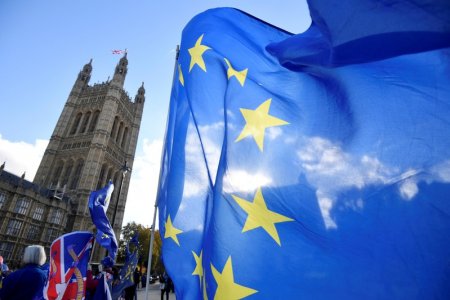EU's top court will give 'quick' verdict on whether UK can reverse Brexit
- Endorsed Brexit Deal 'Only Possible' Way to Lead UK to 'Bright Future' - May
- EU, Britain agree draft deal on post-Brexit ties, await summit approval
- UK's top court rejects government bid to stop ECJ hearing Brexit reversal case
Lawyers for a group of Scottish politicians want the European Court of Justice (ECJ) to interpret whether Britain can revoke its notice to withdraw from the EU under Article 50 of the Lisbon Treaty without agreement of the other 27 states.
 |
Britain is due to exit the EU on March 29, two years after London served notice in line with a June, 2016 vote to leave.
But the fate of Brexit remains up in the air, with Prime Minister Theresa May’s draft divorce deal, agreed with the EU on Sunday, facing a difficult vote in parliament on Dec. 11. May has said that if her deal is voted down, Britain could leave without a deal or there could be no Brexit at all.
Some opponents of Brexit want a second referendum giving British voters the option to remain in the EU. May’s government says a second referendum will not happen, and any ECJ ruling that would allow the reversal of Britain’s withdrawal notice would be irrelevant since it is against government policy.
The ECJ said it would deliver its decision “quickly” but gave no specific date.
“The British government don’t seem to want (lawmakers) and the public to know that Article 50 can be revoked. That’s why they fought this case so hard,” Joanna Cherry, a Scottish National Party lawmaker and one of the cross-party group of pro-EU politicians that brought the case told Reuters.
The case was referred to the Luxembourg justices for a ruling by Scotland’s top court and “expedited” for Tuesday’s urgent one-day hearing before a full court of judges.
Article 50 of the EU treaty, which sets the rules for leaving the bloc, states that if a country decides to withdraw, it has two years to agree an exit deal, a deadline which can be extended only if the remaining EU states unanimously agree.
There is no mention of whether a state can change its mind. No other member state has ever left the 60-year-old bloc.
Aidan O’Neill, lawyer for the politicians, told the ECJ a ruling was necessary so lawmakers could make informed decisions.
“These petitioners need to know the options for revocation which are open to withdrawing member states now, to allow them - properly and in a fully informed way - to carry out their duties as democratically elected representatives,” he said.
If Britain could not unilaterally reverse Brexit, then it could be forced out against its wishes, he said.
“It is fundamental to the treaties - and to the values of the European Union - that a member state can choose to revoke its withdrawal from the Union, without the need for the unanimous agreement of all the other member states,” he said.

